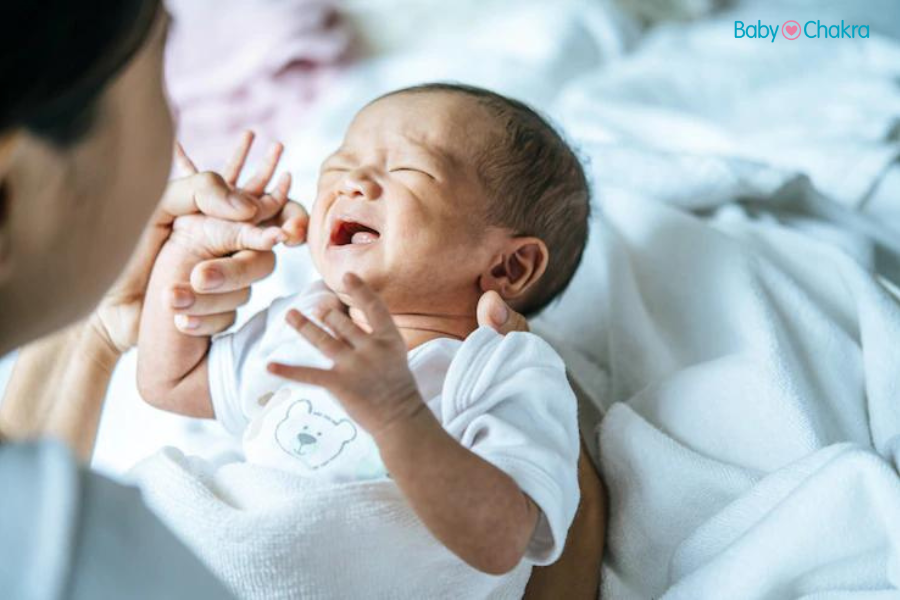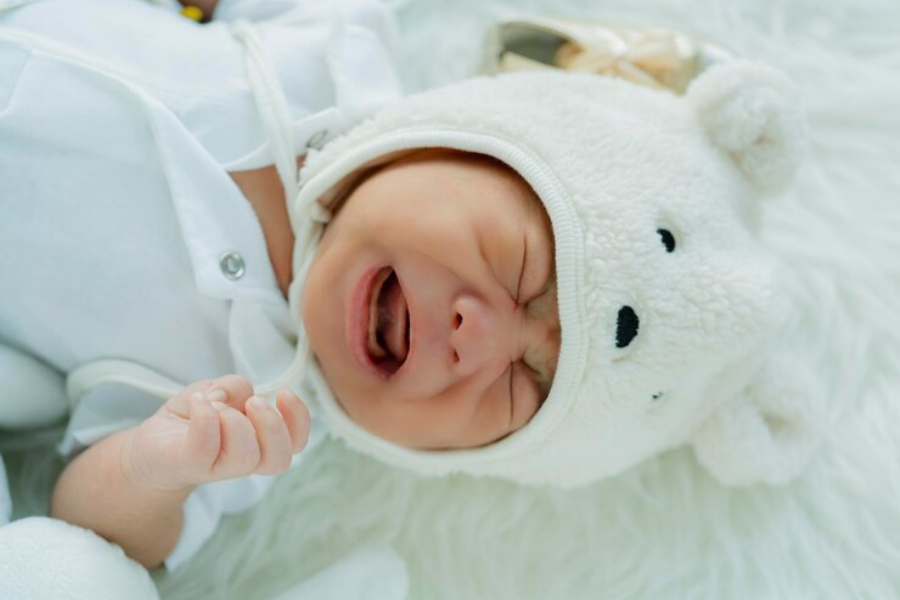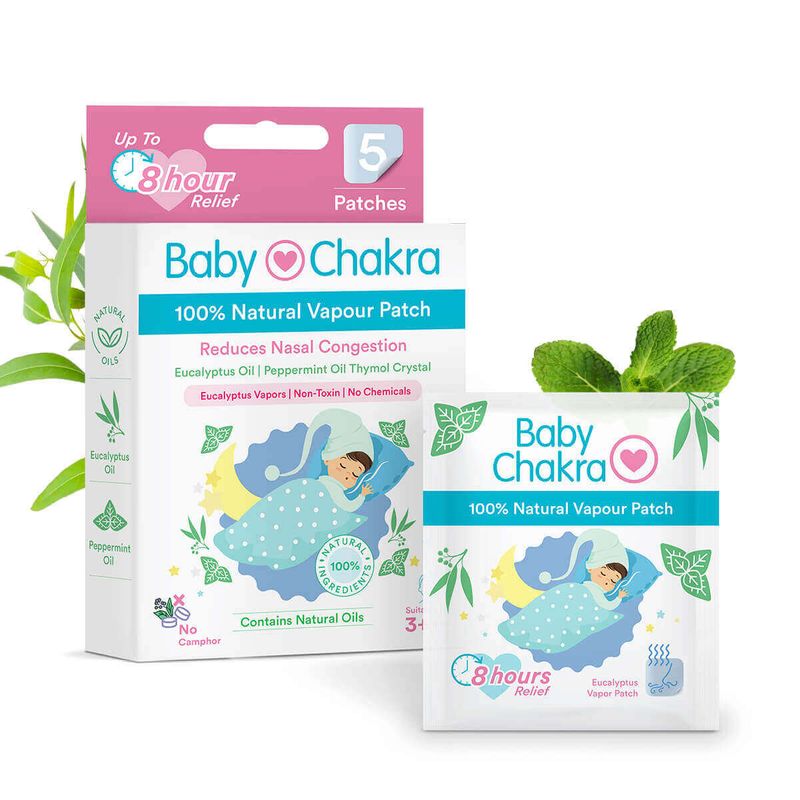
10 Signs To Identify Stress In Babies
29 Mar 2023 | 5 min Read
Manisha Pradhan
Author | 1053 Articles
Stress is a common experience that can affect anyone regardless of their age and babies are no exception. They too experience stress, and parents and caregivers need to identify the signs of stress in babies to help them cope and minimise the impact of stress on their development.
We’ve listed 10 signs to identify stress in babies that you should look out for.
10 Signs To Identify Stress In Babies
1. Crying
Crying is a natural and common behaviour in babies. However, excessive crying can be a sign of stress in babies. Babies who are stressed may cry more frequently and for longer periods than usual. They may also cry inconsolably, even when their basic needs such as feeding, changing, or cuddling have not been met.
2. Sleep Disturbances
Stress can disrupt a baby’s sleep patterns, making it difficult for them to fall asleep or stay asleep. Stressed infants may also wake up frequently during the night or have trouble falling back asleep after waking up. They may also have nightmares or night terrors, which can cause them to cry or scream in their sleep.
3. Changes in Eating Habits
Stress can also affect a baby’s appetite, causing them to eat more or less than usual. When babies are stressed, they may also refuse to eat or drink, even when they are hungry or thirsty. They may also have trouble swallowing or experience digestive issues such as diarrhoea or constipation.
4. Irritability
Babies who are stressed may become easily irritated or agitated. They may be more sensitive to noise, light, or touch, and may fuss or cry when they are overstimulated. They may also become easily upset or frustrated when their routines are disrupted or when they are separated from their parents or caregivers.

5. Regression
Stress can cause a baby to regress in their development, especially in their cognitive and social skills. Infants who are stressed may have trouble focusing, communicating, or interacting with others. They may also revert to behaviours such as thumb-sucking or bed-wetting that they had previously outgrown.
6. Physical Symptoms
Stress can also manifest in physical symptoms in babies. They may have a faster heartbeat, rapid breathing, or tense muscles. They may also experience headaches, stomachaches, or other aches and pains. Usually, when they are stressed, babies may also have skin rashes or hives, which can be a sign of an allergic reaction or other underlying medical conditions.
7. Separation Anxiety
Babies who are stressed may become more clingy or dependent on their parents or caregivers. They may cry or become upset when their parents or caregivers leave them, even for a short period. This behaviour is known as separation anxiety and is a common response to stress in infants.
8. Avoidance
On the other hand, babies who are stressed may also avoid interactions with others. They may become withdrawn or shy and may refuse to play with toys or engage in activities that they usually enjoy. This behaviour can be a sign of social anxiety or depression in infants.
9. Hyperactivity
Stress can also cause a baby to become hyperactive or restless. They may be more fidgety or have trouble sitting still, even during quiet activities such as reading or watching a movie. They may also have trouble concentrating or paying attention, which can affect their learning and development.
10. Regression
Stress can cause a baby to regress in their development, especially in their cognitive and social skills. If they are stressed may have trouble focusing, communicating, or interacting with others. They may also revert to behaviours such as thumb-sucking or bed-wetting that they had previously outgrown.
What Can Parents Do To Reduce Stress In Babies?
Parents can take some simple steps to reduce stress in babies such as:
Create a Calm Environment: Parents can reduce stress in babies by creating a peaceful and soothing environment at home. This means keeping the house quiet and limiting unnecessary noise, avoiding bright lights, and using soft, gentle tones when speaking to the baby. Creating a comfortable and safe space for the baby to play, sleep, and relax can help reduce their stress levels.
Stick to a Routine: Babies thrive on routine, and having a predictable daily schedule can help reduce stress. Establishing regular feeding, sleeping, and playtime routines can help babies feel secure and in control, which in turn can reduce stress. It’s important to be flexible with routines and adapt them as the baby grows and develops.
Respond Promptly to Crying: When babies cry, it’s their way of communicating that they need something. Parents can help reduce stress in their babies by responding promptly to their cries and meeting their needs. This could mean feeding them, changing their diaper, or simply holding and comforting them. By responding to their cries promptly, parents can help babies feel secure and calm.
Provide Physical Contact: Physical touch is essential for a baby’s development and can help reduce stress. Skin-to-skin contact, cuddling, and holding the baby close can all help to soothe and calm them. Babywearing, where the baby is carried in a sling or carrier close to the parent’s body, is another way to provide physical contact and help reduce stress.
Taking care of a baby can be stressful, and parents need to take care of themselves as well. This could mean taking breaks when needed, getting enough sleep, eating a healthy diet, and finding ways to relax and reduce stress. When parents are calm and relaxed, it can help their baby feel more at ease as well.
You can keep these natural products handy to relieve pain and discomfort in babies:
Also Read:
These Traditional Practises Of Skincare For Babies From Around The World Is Sure To Surprise You!
Baby’s First Summer: 8 Must-Have Summer Skincare Essentials
Cover image source: freepik
A


Related Topics for you
Suggestions offered by doctors on BabyChakra are of advisory nature i.e., for educational and informational purposes only. Content posted on, created for, or compiled by BabyChakra is not intended or designed to replace your doctor's independent judgment about any symptom, condition, or the appropriateness or risks of a procedure or treatment for a given person.


